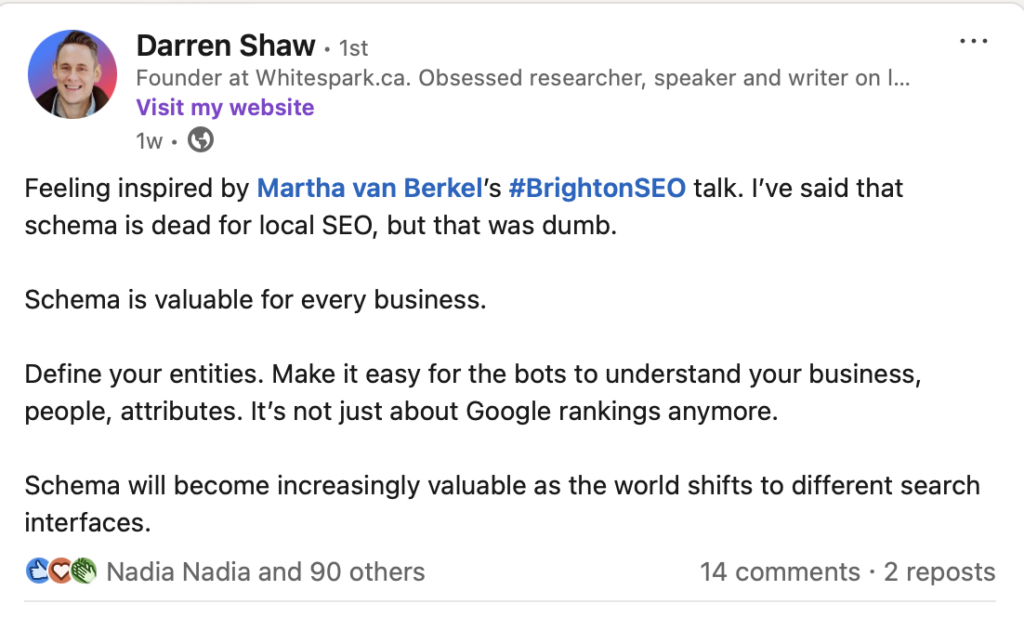🤓 The 2026 Local Search Ranking Factors are here!! Check out the report!
🤓 The 2026 Local Search Ranking Factors are here!! Check out the report!



Confession time: I’ve never really been sold on the concept of schema for small local businesses because 1) it places a not-insignificant burden on business owners to implement, and, 2) Google ought to be smart enough at this point to understand basic facts about brands without publishers having to use a lot of fancy markup. These are biases on my part.
That being said, anyone tasked with local search marketing is always going to be seeking ways to make the brands they represent stand out in the SERPs, and today, we’re going to talk to three world-class local SEOs about the current state of schema to help you decide whether there is still a practical use case for it going forward. We’ll look at what schema types people are still employing and why, and we’ll do a little speculation about schema and Google’s Knowledge Graph.
In March of 2024, our own Darren Shaw sparked an important discussion on social media by declaring that schema was dead for the following reasons:
While Darren mentioned that there were some edge cases in which schema might still be useful, SEOs responding to his thread voiced valuable convictions that there is still a strong argument in favor of particular forms of the markup, even for smaller local brands. Darren is always open to having his mind changed by evidence (a vital character trait for any SEO) and the responses he received inspired a follow-up post in which he summarized the schema use cases that others had shared, including:
These are good instances to keep in mind, but given that nearly a year has gone by since this significant industry conversation occurred, I wanted to check in with three of my favorite local SEOs to see how they’re feeling about schema for local businesses as we head into the new year.
Vice President of Sterling Sky Colan Nielsen takes a practical approach about schema making sense only when there is a demonstrable result. Pay attention to his fascinating remark about clicks:

“Based on our testing, the only schema that is worth spending time on is schema that influences the look of the search results and increases clicks to the website. Product schema is the only type that accomplishes this in a meaningful way for the types of businesses that we work with. The most important thing is to be continually testing. For instance, we are even starting to see declines in the clicks the gold stars in the SERP attract. This is something we are keeping a close eye on.”
Claire Carlile, Local Search Marketing Advocate at Jepto, confirms that schema’s relevance to our particular industry has declined, but she issues a very important warning about neglecting it:

“Do we need to accept the fact that schema has declining relevance now that the state of natural language processing means that schema and structured data no longer have a key role in telling Google what your content is about? Quite probably.
I think that, perhaps, from an ‘entity SEO’ perspective it’s worth making sure that you have structured data that aligns with the entity information that you want Google to associate with your entity – so that could be person schema for a person, organisation schema for your organisation, and local business schema for a local business. But be aware that you need to be consistent across sources and platforms – don’t just add your schema and then forget about it.”
Meanwhile, Near Media co-founder Mike Blumenthal affirms that particular uses of schema are still a good fit for quite specific scenarios. Pay attention to his tip about job posting schema:

“Schema is not a be all, end all and its usage depends on the particular situation and the size of the business. One question to ask is if you get some search benefit from it, making it worth your time to implement. For example, Local Review schema no longer works in the US but if your business is in the EU, then it will provide review stars in the SERPs as well as inclusion in the Reviews from Around the Web, so it is definitely worth doing there.
Product and offer schema are worth doing if you have even a little bit of e-commerce with your business. And if you are a larger business that has an active job board, it is worth doing Job Posting schema to appear in the Jobs Listing result that usually appears above the organic results. And if you don’t mind a little grey hat, product schema works great to highlight your local reviews in the organic results.
A single or even two-location business should not worry about local schema. If the locations are clear on the website Google will “get it”. But if you have a multi-location business, local schema makes sense to be sure that Google understands your locations properly, even if there is no visible search results benefit.”
My personal takeaway from listening to my peers? Schema can’t really be declared “dead” or “alive” for 2025. Like Gandalf in J.R.R. Tolkien’s The Lord of the Rings, schema may feel like it has died, but it is being re-embodied for special purposes. My bias about schema’s usefulness to the smallest local businesses is largely confirmed by what I’ve learned here.
I wouldn’t advise a brand with just 1-2 locations to jump through a lot of hoops to implement this markup in most cases. However, company location, size/authority, and goals could mean that one of your clients is the exception, and that at least some degree of priority should be given to exploring how implementation of schema for persons, organizations, jobs, reviews, and other aspects might yield desirable results.
At least… that’s my position until I say hello to the elephants in the room: LLMs and AI.
Confession number two: another bias of mine is tending to think of the smallest local businesses first. I always want them to win, because I’m philosophically tied to the outlook that communities are better places to live when they have strong local economics. That being said, there are many excellent multi-location brands that provide vital resources to their communities, and as we move away from thinking about local solopreneurs and mom-and-pops, the commentary I’ve highlighted above from three of my favorite local SEOs starts to shape a different story.
Colan is emphasizing the need for testing, Claire is emphasizing entity SEO, and Mike is emphasizing that we’re in a different ballgame if we’re talking about schema in the context of complex business models like multi-location brands.
Shortly after Google acquired Metaweb in 2010 and founded its Knowledge Graph, at least in part, on Metaweb’s Freebase collection of structured data, the search engine began signaling that the future of search would rely on “things not strings”. In brief, this means that, rather than search depending on Google being able to match strings of keywords, it would revolve around understanding entities (like people, places, and things) and the relationship (or lack of relationship) between them. This shift is often described as Google having moved from lexical search (matching search engine results to words/phrases literally) to semantic search (understanding the intent behind searchers’ language to better match their queries to relevant results).
Because of Google’s championing of their Knowledge Graph, SEOs have spent the past 12 years trying to make the shift from thinking in terms of entities instead of the keywords many of us cut our teeth on. This has been a slow process, and publishers are still having to present this transition of mindset as novel. I’ll quote iPullRank’s Garrett Sussman in a recent interview he was conducting on the topic of helping Google and LLMs understand your business with AI:
“We need to change the way we’re all thinking about SEO. We’re so used to thinking about keywords, the concept of entities and the Knowledge Graph… it’s a completely different way to think about building out our content.”
I highlight this because, despite the passage of time since the launch of Google’s Knowledge Graph, business owners and marketers are all at different stages of trying to make this transition. This is why it can be shocking to see quotes like this one from iPullRank’s founder, Mike King:
“This is my immediate reaction, but after watching this demo of what appears to be called “Bespoke UI,” it seems like structured data is pretty much all your website is going to be good for as it relates to the Google environment.”
It can be rather startling to think of a future in which, as far as Google is concerned, the only thing that matters about your website is whether or not it contains structured data to fuel a “bespoke” AI experience tailored to individual users. But…
Duane Forrester, who helped launch schema.org, left this response to Mike King’s reaction to watching the above linked Google video:
“Yup. Since day one – and hey, I announced schema.org on day one – I’ve been telling people it’s important. It’s about understanding. And what do you know…? Now our entire future is about understanding. This is our Splinternet. The beginning of where we see those who have done the work leave those who have not, behind.”
Nor would Mike King’s reaction surprise Martha and Mark van Berkel of schema App who are publishing and presenting on cutting edge concepts such as:
If, like me, you are getting the feeling that a sector within our large industry is very excited about schema, and it may be time for you to reevaluate it in the context of both larger local businesses and Google’s Knowledge Graph, I suggest starting with the first link in that bulleted list, which is the slide deck of Martha Van Berkel’s recent presentation at Brighton SEO and which impressed Darren a great deal:

Final confession: I’m more convinced than I was a year ago that schema has a future, due to the rise of AI. In fact, despite my bias that Google should just understand things without local business owners having to get fancy, I’m working on being more empathetic towards the vast challenge Google faces of having to associate and disambiguate entities. And, also because of the rise of AI, the apparent and growing dissatisfaction with Google and the sense that, as a product, it has gotten worse, I feel rather on the edge of my seat about what, exactly, is going to happen next year in search.
My intuition (which I’ve come to rely on more and more the longer I’ve worked in this industry) is that Google is struggling. I see further signs that point this way in news that broke in the midst of my writing this piece, with Google suddenly dealing out apparent manual penalties for site reputation abuse to some of the largest publishers that have been called out by many in the SEO industry for being undeserving of the universal high rankings they’ve enjoyed for content that bears little relationship to their areas of expertise.
So, what if… what if we are on the verge of Google beginning to demote enormous content farms in favor of better intent matching that actually delivers an improved search experience? What if your medium-to-large sized local business is about to find itself becoming more necessary to Google’s Knowledge Graph experiment, and what’s needed for that to happen is clearer demarcation of the entities that make up and revolve around your company?
Well, then, schema is looking like a stronger candidate. If, like me, you’ve kind of sidelined it since it first launched, then 2025 would be a good year to reappraise what it might do for you as search changes. After all, who saw that Reddit would take such an encore in 2024? Not me! But being open to changing our minds is a strength, not a weakness, and I’m spending a little time on Reddit every month these days.
Why not start with Google’s own guide for implementing local business schema and start following the people featured in today’s column on Linkedin and Bluesky to see whether an overlooked opportunity to make your business clearer to Google might help you play a role in the better search future all of us want?

Miriam Ellis is a local SEO columnist and consultant. She has been cited as one of the top five most prolific women writers in the SEO industry. Miriam is also an award-winning fine artist and her work can be seen at MiriamEllis.com.
Whitespark provides powerful software and expert services to help businesses and agencies drive more leads through local search.
Founded in 2005 in Edmonton, Alberta, Canada, we initially offered web design and SEO services to local businesses. While we still work closely with many clients locally, we have successfully grown over the past 20 years to support over 100,000 enterprises, agencies, and small businesses globally with our cutting-edge software and services.